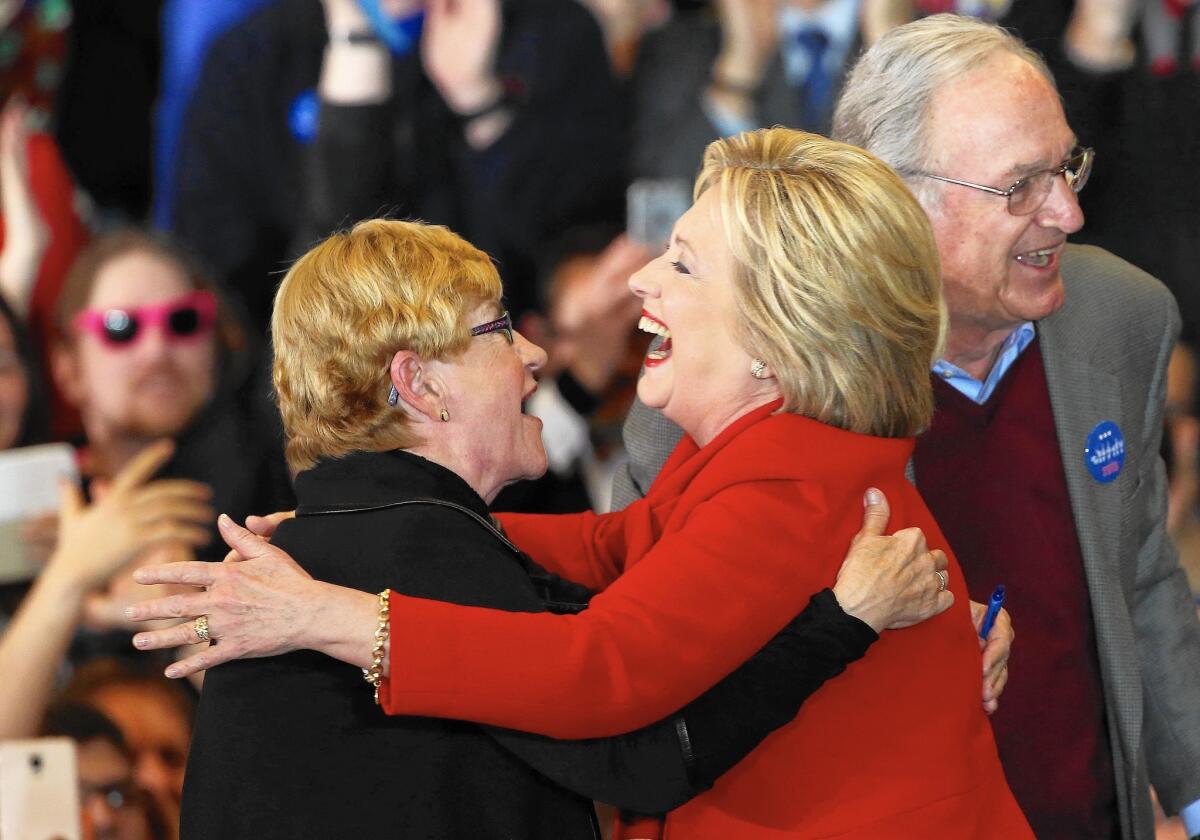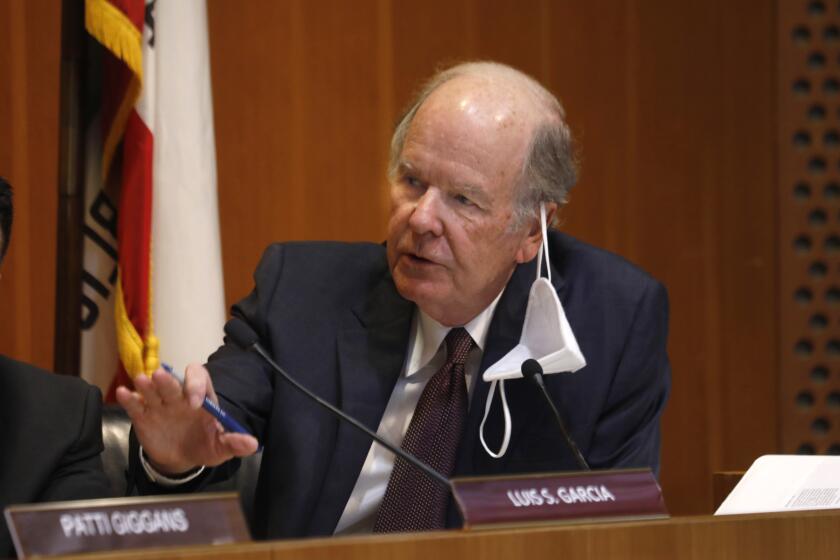California’s presidential primary might matter, but the odds are against it

- Share via
in SACRAMENTO — It’s conceivable that California’s votes will be worth counting when the presidential primaries finally reach the state in June.
Conceivable, but still unlikely.
The best bet is that Hillary Clinton effectively will lock up the Democratic nomination by mid-May.
The Republican contest is more iffy, because it’s now essentially a three-man race. Still, the history of modern presidential politics shows that someone is likely to clinch the nomination before June.
By the time Californians are allowed to vote, Democratic candidates will have collected 82% of the convention delegates from other states. GOP contenders will have picked up 88%.
Because of the Iowa caucus results, however, Californians who bother to vote may not be wasting their time.
Vermont Sen. Bernie Sanders would need to win, as expected, in neighboring New Hampshire on Tuesday. Then things will get tougher. He’ll have to remain competitive in March through the Southern states, with their large numbers of Clinton-leaning black voters.
But Sanders has one thing going for him: young voters.
In Iowa, where he lost to Clinton by only three-tenths of one percentage point, the 74-year-old self-proclaimed socialist was supported by 84% of those under 30. Moreover, he was backed by 58% of caucus attendees 30 to 45.
Those numbers essentially mirror California, according to a Field poll last month. Likely Democratic voters under 40 supported Sanders over Clinton 57% to 32%. Those over 40 sided with Clinton. Among all age groups, she was favored 46% to 35%.
For California’s Republican votes to mean anything, three candidates will need to remain relatively bunched, splitting the delegates in other states.
Donald Trump — the big loser in Iowa by finishing runner-up — will need to emerge victorious in New Hampshire, as expected, or he may just fulfill all the prophecies and implode.
After all, it was Trump who proclaimed just before the Iowa caucusing: “Unless I win, I would consider this a big, fat, beautiful — and, by the way, a very expensive — waste of time.”
The blowhard billionaire has been selling himself as a winner. But Trump has never run for office before. We’ll see how he handles losing. He just might declare political bankruptcy.
When candidates start losing, their supporters tend to slink away. It’s human nature.
As Gen. George S. Patton, standing in front of the giant American flag, told his troops: “Americans love a winner and will not tolerate a loser…. Because the very thought of losing is hateful to Americans.”
Sure, that was only a movie. But there’s a lot of fiction and entertainment in campaigning too.
Whatever happens, Trump largely can blame his Iowa loss on arrogance and inexperience. That led him to drop out of the Fox News debate because he didn’t like one moderator, anchor Megyn Kelly, whom he had called a bimbo. Trump showed them. And the voters showed him.
Refusing to debate did two things: It provided a bigger stage for Sens. Ted Cruz of Texas and Marco Rubio of Florida to shine. And it made Trump look like a pouting, spoiled bully.
“All the pundits, myself included, thought [Trump] had pulled off a brilliant strategy,” says Dan Schnur, director of the Jesse M. Unruh Institute of Politics at USC. “But it looks like the voters of Iowa didn’t like being disrespected.”
Schnur has previous experience with debate snubbing.
In 2000, he was the spokesman for Sen. John McCain’s presidential campaign. California held a March primary. And a few days before, the senator pulled out of a Times/CNN debate.
“I went crazy,” Schnur says. McCain finally agreed to debate by satellite, but performed poorly against the ultimate primary winner, George W. Bush.
“That sealed the deal for Bush,” Schnur says. “Californians were offended.”
It seems incongruous that the big winner would be the candidate who finished third — behind the big loser who wound up in second. But that’s what happened in Iowa with Rubio. He beat expectations and trailed Trump by only one percentage point.
That makes him the best hope of the “establishment,” with a fair chance of surviving until California. The other so-called establishment wannabes should be dropping out any day after New Hampshire. Will former Florida Gov. Jeb Bush really want to risk losing badly in his home state on March 15?
Cruz, the proclaimed Iowa winner, holds similar views to Rubio. But Rubio’s tone and demeanor are smoother.
Cruz draws heavy support from evangelical Christians. That will help in the South. But the voters become more secular as the primaries move west.
“As a Christian, it’s incredibly offensive to hear Cruz basically analogize his campaign to Christ’s resurrection,” Sacramento-based GOP consultant Rob Stutzman tweeted after listening to Cruz’s victory speech.
The Field poll found Cruz with a slight lead over Trump in California, and Rubio 12 points back in third. But that was before Iowa.
Stutzman doesn’t think any candidate will clinch the nomination until late in the primaries.
Will California matter? “It’s still pretty unlikely,” Schnur says. “But it’s a lot more plausible than it was last weekend.”
Los Angeles-based Democratic consultant Bill Carrick thinks there’s “maybe a 40% chance” of the GOP race not sputtering out before June. “A little less chance on the Democratic side.”
This is all ludicrous, of course. The nation’s most populous state — with 12% of the people — has to hope for candidate miscalculation and chaos in other states so it can participate in choosing the next president.
For that, we can blame our leaders in Sacramento.
Twitter: @LATimesSkelton
MORE ON THE CAMPAIGN:
As Democratic race hits New Hampshire, it’s Bernie Sanders who holds the cards
Trump’s Iowa loss reveals campaign vulnerabilities
Who’s a real progressive? Sanders and Clinton make their cases at New Hampshire town hall
More to Read
Sign up for Essential California
The most important California stories and recommendations in your inbox every morning.
You may occasionally receive promotional content from the Los Angeles Times.














